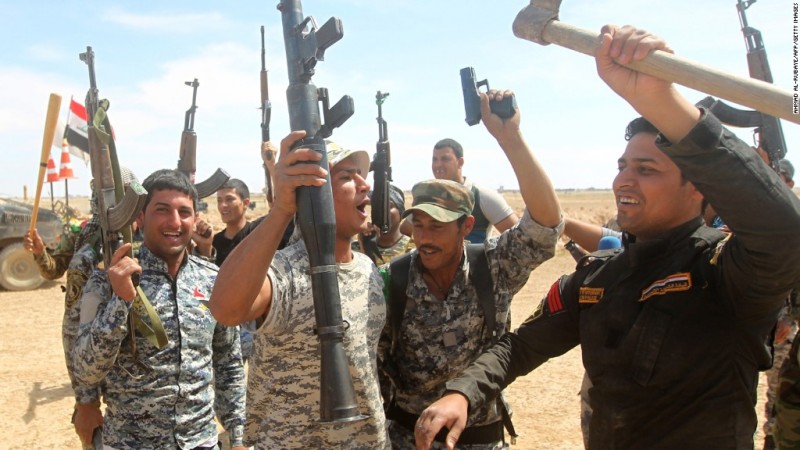Iraqi forces battling to wrest Tikrit from ISIS are now in control of the city, Prime Minister Haider al-Abadi said Tuesday on Iraqiya TV.
Al-Abadi, who is also the top military commander, said on state television that the city was liberated.
While al-Abadi has declared victory in the battle, pockets of fighting continues. Iraqi forces and Shiite militias are taking part in clearing operations.
Iraqi forces reached the center of Tikrit and hoisted the nation’s flag on top of the Governorate Building, al-Abadi said. Fighting continued on the outskirts of the city, he added.
Tikrit had been under ISIS control since June.
The push into Tikrit comes days after a series of U.S.-led airstrikes targeted ISIS targets around the city.
The airstrikes made it possible for the Iraqi forces to move through the city. Troops reported finding dozens of roadside bombs and booby-trapped buildings as they combed the city.
At a Cabinet meeting before he declared Tikrit liberated, al-Abadi was already calling the operation a success.
“The success of the Tikrit experiment will be repeated in other areas because of the results it has achieved on the battlefield, on a humanitarian level, protecting civilians as much as possible, in addition to the low casualties amongst our security forces,” he said.
Iraqi forces have tried multiple times to win back Tikrit since ISIS conquered the city as part of its campaign to amass an expansive Islamic caliphate but failed until now. This operation, however, was the biggest by the Iraqi military so far.
“We managed to take (ISIS) by surprise,” the Prime Minister said. “And our air force … in addition to coalition air force, helping Iraqi forces, managed to deal severe blows to ISIS and the enemies of Iraq. And our ground forces with the blood of Iraqis, Iraqis alone with their own blood, were able to liberate this land.”
The latest push began after al-Abadi ordered Iraqi forces on March 1 to retake Tikrit and Salahuddin province.
Militants have been under pressure ever since in the battleground city, which is the birthplace of former Iraqi dictator Saddam Hussein and is located about 160 kilometers (100 miles) north of Baghdad.
The Iraqi forces were aided by a coalition made up of mostly Shiite militiamen and volunteers.
The militia members, estimated to number around 20,000, are backed by Iran. The offensive marked the first very overt participation of Iranian advisers on the front lines.
The victory in Tikrit sets the stage for Iraqi forces to take back an even bigger prize: Mosul.
Mosul is Iraq’s second-biggest city and the site of one of its military’s biggest embarrassments, when Iraqi troops dropped their weapons and ran rather than defend their posts last June.
A U.S. official said in February that up to 25,000 Iraqi troops plan to return to Mosul in April or May and, ideally, win it back. This comment came days after al-Abadi told the BBC that while there’s still work to do, he felt confident Iraqis could recapture the key northern city.
